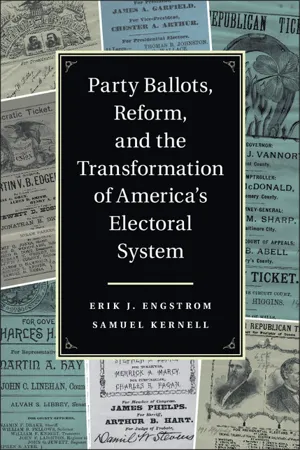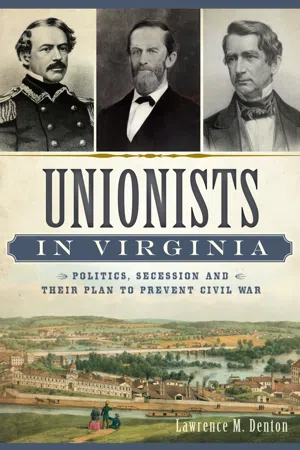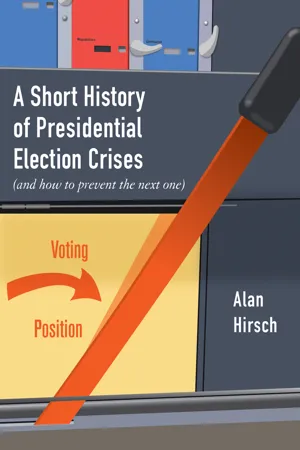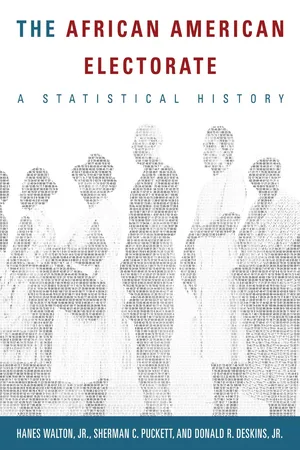History
1870 Presidential Election
The 1870 election in the United States was significant as it marked the first time African American men were able to vote in the Southern states following the passage of the 15th Amendment. This election saw the Republican Party gain significant support from African American voters, leading to the election of several African American politicians to state and federal offices.
Written by Perlego with AI-assistance
Related key terms
1 of 5
4 Key excerpts on "1870 Presidential Election"
- Erik J. Engstrom, Samuel Kernell(Authors)
- 2014(Publication Date)
- Cambridge University Press(Publisher)
2 The Puzzle of Responsive Elections The presidential election of 1880 is most often remembered for its violent aftermath. The assassination of President James Garfield, just six months into his administration, by a jilted job seeker, casts a long historical shadow over the election. But what many political scientists will find more intriguing about 1880 is the election itself. It featured one of the highest voter turnouts – 80 percent of eligible voters – and narrowest presidential vote margins in American history. The 8 million presidential votes broke in favor of Garfield by just more than 2,000, yet they were distributed efficiently, allowing him to eke out a narrow Electoral College majority and keep the White House under Republican control. But perhaps the election’s most remarkable feature is the breadth of the Republican victory in Congress and across the nation. Republicans retook control of the House of Representatives for the first time since 1872. Whether Republicans would wrest control of the Senate from Democrats would not be officially decided until the state legislatures convened the following January. Yet Republicans had ample cause for optimism. Of the twenty-seven non-Southern state legislatures elected that year, Republicans won a majority in both legislative chambers in twenty states and split control in two others. Among these wins were bicameral majorities in six legislatures served by lame-duck Democratic senators. Early the following year the final wave of the Republican victory lapped into Washington with the election of the narrowest possible Senate majority – that is, requiring the Republican vice president’s tie-breaking vote. Considering the Framers had carefully designed the upper chamber to withstand “impetuous” swings of public sentiment by staggering terms and setting up indirect elections, these results are all the more striking. And yet we can see in Table 2.1 that this outcome was unexceptional for the era.- eBook - ePub
Unionists in Virginia
Politics, Secession and Their Plan to Prevent Civil War
- Lawrence M. Denton(Author)
- 2014(Publication Date)
- The History Press(Publisher)
CHAPTER 2 THE PRESIDENTIAL ELECTION OF 1860Sorting northerners and southerners into mutually distinct pigeonholes runs the risk of imposing an arbitrary order on a messy irrational tragedy.—Daniel W. Crofts, Old SouthamptonDuring the nineteenth century, Virginians voted in dozens of elections—from presidential and gubernatorial elections to elections for constitutional conventions and special elections of one kind or another. Two of these elections—the presidential election of 1860, held on Tuesday, November 6, and the election for delegates to the Virginia State Convention, held on Monday, February 4, 1861—had the potential to position the state to play a key role in averting civil war. The presidential election, despite enflamed rhetoric and unfamiliar prospects caused by a four-way race, followed normal voting patterns for the most part. But it was the other election that would prove so portentous. The election for delegates to the Virginia State Convention was simply a monumental happening—it was an explosive turnabout for Virginia’s electorate whereby previous party loyalty was discarded and a new political entity took shape. Like the phoenix rising out of the ashes, it was the most dramatic political realignment in the state’s history. The election of 1860 will be analyzed here and the election of 1861 in Chapter 3 .First, a look at the role Southern Republicans played at the Republican National Convention, held in Chicago from May 16 to 18, 1860, to nominate a president and vice president and adopt a party platform for the upcoming presidential election in November. As the representatives of this new political party (this was only the second time the party would field a national ticket) gathered at the Wigwam, the structure built to house the convention in Chicago, it was a foregone conclusion who the party nominee would be. While a half dozen men had thrown their hats in the ring, most as favorite-son candidates from a given state, it was William Henry Seward whom most delegates felt would secure the nomination on the very first ballot. - eBook - ePub
A Short History of Presidential Election Crises
(And How to Prevent the Next One)
- Alan Hirsch(Author)
- 2020(Publication Date)
- City Lights Publishers(Publisher)
THREETHE ELECTION OF 1876In America in 1876, national pride intersected with national insecurity. The year marked the 100th anniversary of U.S. Independence, an event greeted with mass celebration, including the ballyhooed Centennial Exposition in Philadelphia, a grand display of the nation’s achievements. At the same time, the Civil War, little more than a decade old, remained a vivid reminder of the nation’s flaws and fragility. Moreover, if the centennial served to unite the nation, the ongoing fight over Reconstruction reinforced the nation’s still bitter divisions.Against that backdrop, Democrats sought to win their first presidential election in forty years, while the Republicans aimed to extend their four consecutive terms in the White House. (There were four Whig Party presidents during the 1840s and ’50s.) The fight for the nomination of both parties was wide open. Unlike the three previous cycles, in which Republicans more or less anointed the incumbent presidents, Lincoln and Grant, they had no prohibitive favorite (given Grant’s intent to step down after two terms, following the precedent established by George Washington and adhered to by every president since). The Democrats, too, lacked a clear front-runner.The Republican field included three prominent U.S. senators: Maine’s James Blaine, New York’s Roscoe Conkling, and Indiana’s Oliver Morton. Morton, who as governor of Indiana during the Civil War had supplied the Union far more troops than requested, suffered a stroke in 1865 that left him permanently disabled but did not diminish his lust for the presidency. Blaine and Conkling, who sowed the seeds of their candidacies for years, were such bitter enemies that Conkling, asked whether he could imagine supporting Blaine, replied, “I don’t engage in criminal practice.”56 - eBook - PDF
The African American Electorate
A Statistical History
- Hanes Walton, Sherman C. Puckett, Donald R. Deskins(Authors)
- 2012(Publication Date)
- CQ Press(Publisher)
Three states, Mississippi, Texas, and Virginia, would only be readmitted afterwards, mean-ing that their voters would have to wait until 1872 to vote in a presidential election. And for the presidential election of 1868, Florida did not have popular voting for president; rather, the state legislature cast the state’s three electoral votes. 3 Only in the 1872 election would Florida once again return to the popu-lar voting method in presidential elections. Thus, it is essential that our analysis for 1868 focus upon the seven states that had popular voting for the presidential nominees and, for the 1872 election, focus upon all eleven states of the old Confederacy. In terms of the congressional elections, we will focus on the African Americans running for seats in the House of Representatives in those seven states and on those running in all of the eleven states for the 1872 election. 4 There is no need to focus on African American candidates for the Senate because those officeholders were selected by state legislatures until just prior to ratification of the Seventeenth Amendment to the Constitution in 1913. 5 We also need to alert the reader to how this racially based presidential and congressional election data will be acquired and organized. For the presidential and congressional elections in both 1868 and 1872, we will begin with the county as our data unit of analysis: specifically those counties where African Americans had the voter registration or the population majori-ties. Next, obtaining the election data from the specific congres-sional districts where African American candidates ran, we will where possible match up the African American majority counties to the county and/or multiple counties within these congressio-nal districts. Where such congressional districts are made up of partial counties, the reader will be alerted to any modifications we make to our majoritarian county approach.
Index pages curate the most relevant extracts from our library of academic textbooks. They’ve been created using an in-house natural language model (NLM), each adding context and meaning to key research topics.



